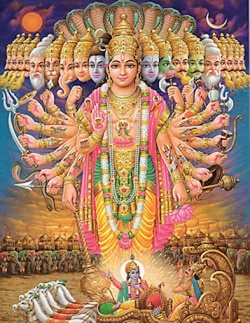Difference between revisions of "Brahmanism"
m (Text replacement - "Christianity" to "{{Wiki|Christianity}}") |
|||
| Line 1: | Line 1: | ||
[[File:Vishnu-78oi.jpg|thumb|250px|]] | [[File:Vishnu-78oi.jpg|thumb|250px|]] | ||
| − | [[Brahmanism]] was the dominant [[religion]] in northern [[India]] at the [[time]] of the [[Buddha]]. It was based on the [[Vedas]] and its supreme [[god]] was [[Brahma]]. In the centuries after the [[Buddha]], [[Brahmanism]] gradually evolved into what is now called, and is recognizable as, [[Hinduism]]. | + | [[Brahmanism]] was the dominant [[religion]] in northern [[India]] at the [[time]] of the [[Buddha]]. It was based on the [[Vedas]] and its [[supreme]] [[god]] was [[Brahma]]. In the centuries after the [[Buddha]], [[Brahmanism]] gradually evolved into what is now called, and is recognizable as, [[Hinduism]]. |
| − | In the process, many {{Wiki|Brahmanical}} [[doctrines]] and practices fell into abeyance or changed radically, so that while [[Brahmanism]] and [[Hinduism]] have much in common, they also have distinct differences as well. [[Scholars]] sometimes distinguish between them by calling them {{Wiki|Vedic}} [[Hinduism]] and Purāṇic [[Hinduism]]. | + | In the process, many {{Wiki|Brahmanical}} [[doctrines]] and practices fell into abeyance or changed radically, so that while [[Brahmanism]] and [[Hinduism]] have much in common, they also have {{Wiki|distinct}} differences as well. [[Scholars]] sometimes distinguish between them by calling them {{Wiki|Vedic}} [[Hinduism]] and Purāṇic [[Hinduism]]. |
| − | The situation is similar to the relationship between {{Wiki|Judaism}} and {{Wiki|Christianity}}.The latter grew out of the former, and retained many of its features, while developing many new ideas, to the degree that the two became distinct [[religions]]. | + | The situation is similar to the relationship between {{Wiki|Judaism}} and {{Wiki|Christianity}}.The latter grew out of the former, and retained many of its {{Wiki|features}}, while developing many new [[ideas]], to the degree that the two became {{Wiki|distinct}} [[religions]]. |
{{Wiki|Brahminism}}, [[Buddhism]] and [[Hinduism]], L.M. Joshi, 1970. | {{Wiki|Brahminism}}, [[Buddhism]] and [[Hinduism]], L.M. Joshi, 1970. | ||
Latest revision as of 20:48, 19 September 2013
Brahmanism was the dominant religion in northern India at the time of the Buddha. It was based on the Vedas and its supreme god was Brahma. In the centuries after the Buddha, Brahmanism gradually evolved into what is now called, and is recognizable as, Hinduism.
In the process, many Brahmanical doctrines and practices fell into abeyance or changed radically, so that while Brahmanism and Hinduism have much in common, they also have distinct differences as well. Scholars sometimes distinguish between them by calling them Vedic Hinduism and Purāṇic Hinduism.
The situation is similar to the relationship between Judaism and Christianity.The latter grew out of the former, and retained many of its features, while developing many new ideas, to the degree that the two became distinct religions.
Brahminism, Buddhism and Hinduism, L.M. Joshi, 1970.
